Categories
Our developers' blog is divided on several collectors themes or categories:
Tags
Use tags below to find a required article in the blog:
5 years
art
auction
Australia
award
bank
banknote
banknotes
Belarus
bill
bills
Books
Brazil
Canada
cars
cat
celebrity
China
coin
coin stacking
coins
collage
collection
collector
collectors
competition
cool
CS
currency
Czech Republic
design
dollar
dollars
euro
face
flag
France
fun
funny
germany
hobby
India
Japan
king
library
medals
Mexico
microscope
mint
money
moneygami
museum
news
NYC
Olympic Games
paper money
penny
photo
Pound
review
riddle
rouble
Royal Mint
ruble
rubles
rupee
Russia
scotland
set
sightseeing
Soviet Union
stamp
stamps
Switzerland
travel
tree
Ukraine
United Kingdom
United States
video
vinyl
war
won
ww2
yuan
| Developers' Blog
November 3
2010
|

American dollars are burned during a ceremony in honor of deceased ancestors in the old district of Hanoi, Vietnam.
|
July 22
2010
|
_front.jpg)
When bill in 5000 RUR fold in half - the square of it will match the square of residence that you can buy in russian capital for 5000 rubles (near $160). 
|
June 18
2010
|
"Mason" word, it is just another masonic symbolism on the dollar bill:

The ritual of Freemasonry is well endowed with symbols – things familiar that could convey a hidden meaning to those initiated. Man uses signs, pictures, emblems and words etc to convey ideas from individual to individual and some of the aforementioned lend themselves to symbolism more than others. This was especially so in the Age of Enlightenment during the 18th century.
|
June 10
2010
|
I was quite curious about this whole ‘German Vampire Banknote’ thing, so I decided to do some research. I found that picks 70, 71, and 72, which feature a male portrait by Albrecht Durer are all considered to be German Vampire Banknotes. When looking at the picture some people see a vampire sucking on the neck of the young man. This has been interpreted by some as a representation of the French sucking the blood of the Germans through the reparations of World War I. I have tried to show this in the image below:
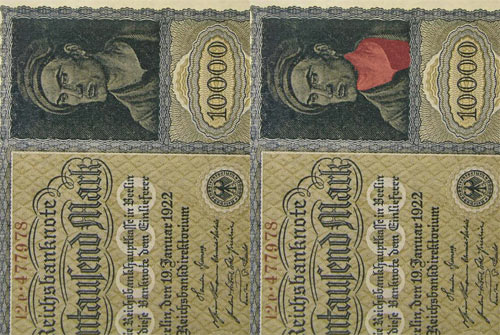
German Vampire Note: 10000 Marks from 1922 (p72)
Source: RealBanknotes Paper Money Collecting
|
May 20
2010
|

Banknote Building (Kaunas, Lithuania)
Money theme well represents various businesses located in this spectacular building. It's an office center located in the second biggest city in Lithuania. Despite what you might think, this is not a temporal installation. The image of the LTL 1000 banknote is brought onto this building using special enamel paint. The banknote dates back to 1925. However it's not used nowadays.
Architects: Rimas Adomaitis, Raimundas Babrauskas, Darius Siaurodinas, Virgilijus Jocys.
|
May 13
2010
|
Britain axes 500 euro note over organized crime fears. Such is its popularity among criminals, the 500 euro note has earned itself a nickname - the Bin Laden. It is so called because you know it's out there, you know what it looks like, it moves around a lot but no-one ever sees it. But the note's days as a favorite for organized crime gangs, terrorists and money launderers may be numbered after it was withdrawn from circulation in Britain.
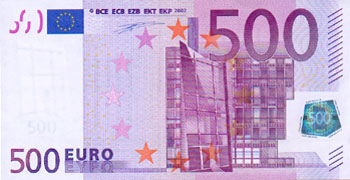
The Serious Organised Crime Agency (Soca) said there there was 'no credible legitimate use' for the notes - which are worth £426 each. UK wholesalers agreed to stop selling the distinctive pink and purple note last month after Soca investigators found nine out of ten were used for illegal activities.
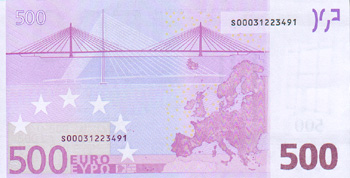
The move is likely to heap pressure on the European Central Bank to withdraw the note from circulation entirely. It remains legal tender in the UK and there are fears British criminals will now simply source their 500 euro notes on the continent, or turn to the smaller value 200 euro note which is worth £170.
Before the ban came into force, Soca found one backstreet money supplier which imported more than £4million worth of the notes in a single year - more than the number used by major high street banks.
Big money: the world's largest denominations
- Euro - 500 note, Value in Pounds £426
- US $ 100 note £67.19
- Chinese Yuan 100 note = £9.83
- Australian Dollar 100 note = £60.20
- Canadian Dollar 100 note = £65.99
- South African Rand 200 note = £17.95
- Swiss Franc 1,000 note = £609.86
- Singapore Dollar 1,000 note = £487.18
- Russian Ruble 5,000 note = £112.31
- Indian Rupee 1,000 note = £14.94
|
April 22
2010
|
Newly designed $100 note aims to thwart counterfeiters with advanced security features, top U.S. Treasury and Federal Reserve officials said on Wednesday:
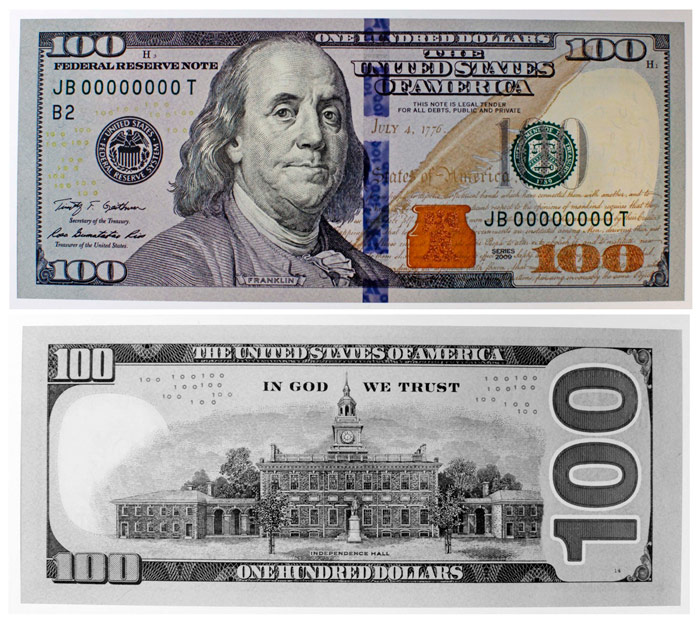
The "new Benjamins" to be released in February 2011 retain the traditional look of the U.S. currency, with Benjamin Franklin's portrait. They aim to foil counterfeiters with difficult and costly to reproduce features such as a blue three-dimensional security ribbon with alternating images of bells and the number 100 that move and change as the viewing angle is tilted.
The new notes, which cost slightly more to produce, also feature a bell image inside a picture of an inkwell that changes from copper to green when tilted, as well as a large "100" that does the same.
"As with previous U.S. currency redesigns, this note incorporates the best technology available to ensure we're staying ahead of counterfeiters," U.S. Treasury Secretary Timothy Geithner said at a Treasury Department unveiling ceremony. "Welcome to the new Benjamins."
The $100 note is the most often counterfeited denomination of U.S. currency outside the United States due to its broad circulation overseas. It is the highest-denominated note issued by the Federal Reserve.
The approximately 6.5 billion older design $100s already in circulation will remain legal tender after the new notes are released next year.
BEATING THE SUPERNOTE
In recent years, U.S. officials have been trying to combat the continued production of extremely high-quality counterfeit $100 notes they say are produced in North Korea, dubbed the "supernote," which are undetectable to nearly all but the most sophisticated currency experts.
The U.S. Secret Service, the agency charged with policing the cash dollar's integrity, maintains that less than 1/100th of one percent of the $890 billion in physical U.S. currency in circulation is counterfeit. But Secret Service officials say they still encounter supernotes and other highly sophisticated fakes from overseas.
In the United States, the $20 note is the most frequently counterfeited denomination.
The new Benjamins have been in development since 2003. The blue security ribbon is woven into the note's fabric -- not printed on. Another security strip, visible to the left of Franklin's head when the note is held up to light, is embedded into the fabric. Like the old note, the new one has a watermark of Franklin's portrait, also visible when held up to light.
The old notes will be destroyed and replaced as they pass through the Federal Reserve system.
John Large, special agent in charge of the Secret Service's criminal investigations division, said the features were designed to make it easy for merchants and consumers to verify the $100 note's authenticity with a quick examination.
"The best defense against counterfeiters we have is an educated public that can easily authenticate the new $100 note," Lange said.
Federal Reserve Chairman Ben Bernanke said U.S. officials will work to educate people around the world about the new design. Unlike in the past, when most cash dollars were held domestically, as many as two thirds of Federal Reserve notes now in circulation are outside the United States, he added.
|
April 20
2010
|
Do you know exact size of currencies in your wallet? Look, it can be useful to measure quickly something or somebody with some acceptable accuracy:
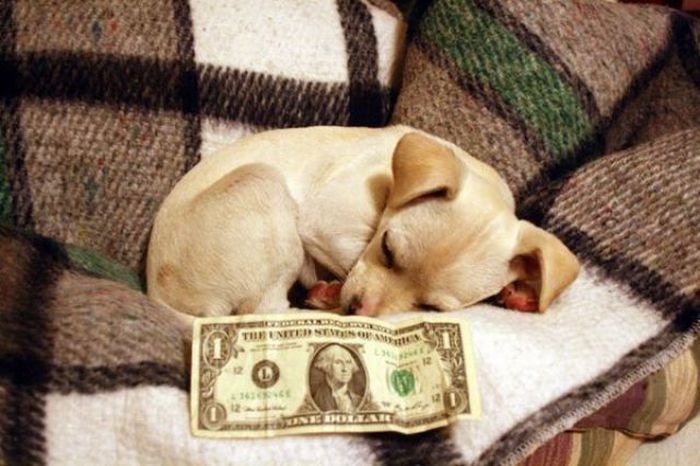
The size of the United States one-dollar bill (the most common denomination of U.S. currency) is approximately 6.14 x 2.61 in = 155.956 x 66.294 mm.
One dollar facts:
The first president, George Washington, painted by Gilbert Stuart, is currently featured on the obverse, while the Great Seal of the United States is featured on the reverse. The one-dollar bill has the second oldest design of all U.S. currency currently being produced, after the two-dollar bill. The obverse debuted in 1963 when the $1 bill first became a Federal Reserve Note. The Bureau of Engraving and Printing says the average life of a $1 bill in circulation is 21 months before it is replaced due to wear. Approximately 45% of all U.S. currency produced today are one-dollar bills. All $1 bills produced today are Federal Reserve Notes. One-dollar bills are delivered by Federal Reserve Banks in blue straps. The inclusion of "In God We Trust" on all currency was required by law in 1955. The national motto first appeared on paper money in 1957.
|
March 18
2010
|
The Scots have a colorful (and tragic) history of fighting the domination of the English that ended, more or less, with the butchery that was the Battle of Culloden (16 April 1746), in which tired, hungry, and somewhat unenthusiastic Scotsmen armed with swords, at best, took on England's best, armed with bayonet-fixed firearms. So it was with some surprise that upon giving a 20 pound note with the likeness of the Queen on it to a cashier for my first purchase in Glasgow's Central train station (a local map book), the 10 pound note I got as change looked like this:
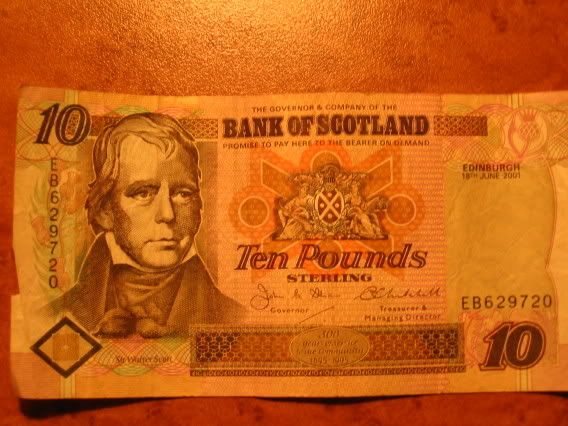
When the typical 10 pound note I see in London looks like this: Read more...
|
January 14
2010
|
A new year has already come. After a big holidays, we are currently trying to finish newer version of the CollectionStudio 3.56 which will include a lot of fixes and as usual a new functionality.
In the same time on other side of the Earth, in Seoul metropolitan, in the hand of a girl's there is 10000 won (South Korea) - about nine dollars.
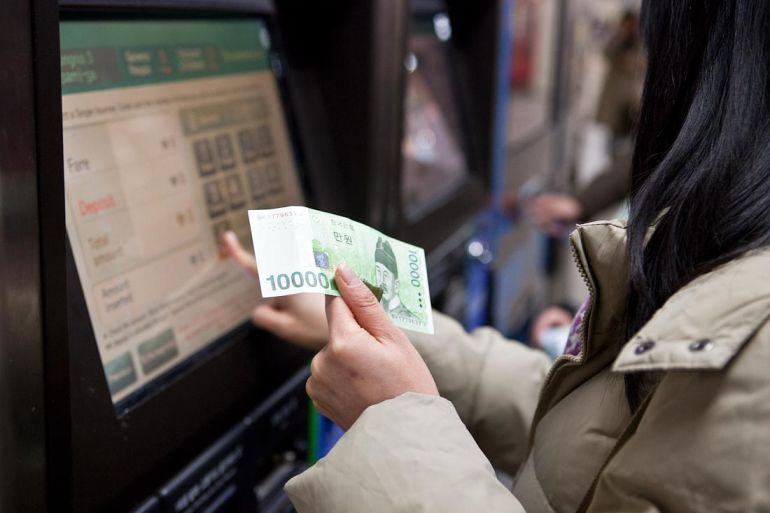
Stay tuned.
|
|